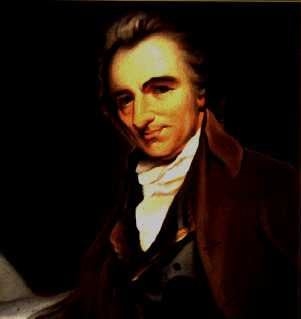 |
Thomas Paine was a famous pamphleteer and writer on politics and religion. His writings greatly influenced the political thinking of the American leaders in the Revolutionary War. I'll start at the beginning in Thetfort, England, where Tom's underprivileged family lived. Thomas didn't get everything he wanted like most kids these days. He barely even got an education and he still became one of the most skilled writers that ever lived.
He started working at the age of 13. Then went to sea at 19. Later he worked as a customs collector but was discharged. His first wife died and he was divorced from his second. In 1774 he was lonely and poor. Then he became friends with Ben Franklin, who wanted him to go to America. When he arrived in America, he started working as an editor for the Pennsylvania magazine and began working for the cause of independence. He wrote a pamphlet called "Common Sense" that demanded freedom from Britain. Paine asserted that the revolutionary war would start a new era of world history. "The birthday of a new world is at hand," he wrote. The colonial leaders approved.
The same with thousands of other colonists. The pamphlet "Common Sense" was the most popular book at the time. He also followed "Common Sense" with "American Crisis." The pamphlet began, "these are times that try men's souls. The summer soldier and the sunshine patriot will, in this crisis, shrink in the service of their country. ...tyranny like hell, is not so easily conquered." Thomas Paine's bold words encouraged the colonial armies even in the darkest of days. In 1777 he became the Secretary of the Congressional Committee of Foreign Affairs.
Paine went to France in 1787 and then to England. While in England in 1791 and 1792, he published "Rights of Man," replying to Edmund Burke's British attack on the French Revolution. So Tom was accused of treason and was outlawed and returned to France. He became a French citizen on August 26, 1792. In 1802, President Jefferson arranged for him to return to America. In 1809, Thomas Paine was buried on his farm.
Most people remember him for his sacrifice and for getting nothing in return. He was committing treason and wasn't afraid of the consequences. He encouraged the Continental armies in the worst of times and I don't think that we would have a democracy and that we would have lost the war for independence if not for him.
Page created on 6/21/2011 3:34:35 PM
Last edited 1/12/2025 5:05:47 PM
